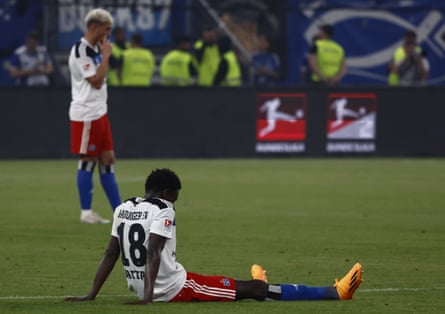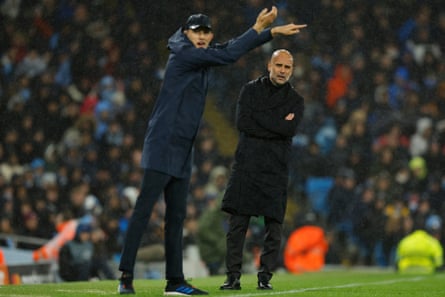It was a thrilling season with a deflating ending, unless you are of a Bayern persuasion. In fact, the denouement was still a bit deflating if you were a Bayern fan, following the team’s tame exits from the Champions League and German Cup, and knowing that Borussia Dortmund’s last-minute slip was the real reason your team was left holding the Bundesliga trophy for an 11th straight season.
The final-day choke by Edin Terzic’s team, only managing a draw at home to nothing-to-play-for Mainz when a win would have guaranteed a first championship since 2012 (and a first non-Bayern champion since then), will forever be 2022-23’s punchline. It overshadowed the 46 points Dortmund collected in 2023 – not to mention Jamal Musiala’s stylish 89th-minute winner at Köln that finally brought the title back to Bavaria on goal difference.
Yet this was, in many ways, a vintage campaign. On the final day of the season every one of the nine fixtures had something riding on it. It’s not always been the case in recent years but, this time, the hope is that next term offers pretty much the same again. Here is a sprinkling of the teams, players and moments that made it special.
Team of the season
It’s been a whirlwind. From promotion via the relegation playoff in 2019 (and when does the second-tier side ever manage that?) to signing Max Kruse and successive qualifications for Europe, Union Berlin have been extraordinary. And this year – despite losing the influential Taiwo Awoniyi, Grischa Prömel and Julian Ryerson – they made the Champions League, sealing it with Rani Khedira’s late winner against Werder Bremen on the final day. The perfect storm of passion and brilliant organisation, Union’s success is at once logical and amazing. “Many of us have been working together here for 19 years,” said the club president, Dirk Zingler, “and we made it from the Oberliga to the Champions League. The path we’re walking is unbelievable.”
Goal of the season
In this every-goal-counts campaign, Joshua Kimmich’s late thunderbolt from distance to save a point against Köln in January seemed incidental at the time, even if it did rob Steffen Baumgart’s men of a famous win in Munich. Eventually, though, this face-saver ended up meaning a lot.
Player of the season
Jude Bellingham was the huge driver of Dortmund’s brush with glory as they went from sixth at Christmas to agonisingly falling short on the final day (and how they missed him as he sat out the final matches through injury). At 19 he earned the captain’s armband not just with his tackles and irresistible surges into the penalty box, but for his palpable communion with the Signal Iduna Park crowd. BVB will miss Bellingham’s heart and leadership as much as his ability.
Early celebration of the season
It could easily have been Uli Hoeness, as Bayern’s honorary president recognised in an interview with Bild when he recalled his wild celebrations in his front room after Musiala struck late in Köln. Had Dortmund conjured a winner afterwards, which would have given them the championship, it would have been “like Schalke in 2001”, he reflected, referencing Patrik Andersson’s late, late goal which snatched the title for Bayern with Die Königsblauen and their fans already celebrating. Nearer the mark in that respect were poor old Hamburg, who thought their fifth season down in the 2.Bundesliga was going to end in promotion after winning 1-0 at Sandhausen on the final day, with thousands of joyous fans invading the pitch.
Only it wasn’t over. Their promotion rivals Heidenheim, who needed to match HSV’s result, were 2-1 down at Jahn Regensburg in the 90th minute but scored twice in 11 added minutes, with Tim Kleindienst’s 99th-minute winner taking them and their long-serving coach Frank Schmidt, who took over in 2007 when the club were in the fourth tier, into the top flight for the first time. Hamburg, meanwhile, were beaten 6-1 on aggregate by Stuttgart in the relegation playoff and must try again next season.

Implosion of the season
If Dortmund’s failure to get it over the line against Mainz will linger in the mind, they wouldn’t even have needed to win had they closed out either of the two other games which they astonishingly let slip at either end of the season: the home loss to Werder Bremen in September, which came after they had led 2-0 in the 89th minute, or April’s 3-3 draw at Stuttgart, when they went 2-0 up, Stuttgart went down to 10 men, came back to 2-2, and BVB led again in the 92nd minute then conceded another equaliser with the game’s final kick. “We thought we had already experienced the worst thing this season,” said a gobsmacked Terzic after the latter, talking about the former. “But this tops it.”
Discreet criticism of the season
After Bayern’s loss against Leipzig in the penultimate game, Deniz Aytekin, the referee, reacted with some prejudice in the media area to word that his former colleague Manuel Gräfe had questioned one of his decisions in his role as ZDF’s TV analyst. “Gräfe sits in Berlin with his 180kg [weight] and talks such shit,” he bellowed. Aytekin was so loud that he drowned out Thomas Müller, being interviewed next to him, who had to pause his own interview and cocked an ear while attempting (largely unsuccessfully) to supress his laughter. “I would like to apologise for my choice of words,” a suitably humbled Aytekin said on Bild TV the following day.
Accountants of the season
After the profligacy of the Lars Windhorst era – €374m blown in three years of failed attempts to take Hertha to the next level – you might have assumed that the major shareholder’s exit would bring an air of mature calm to the club. Sadly not, as the Berliners walked headlong into a string of financial crises under their new president, Kay Bernstein, sacking a sporting director and a coach en route to another relegation. “Now we don’t just have to deal with people who are only concerned about personal gain,” said long-serving board member Ingmar Pering after he quit, “but also with collective incompetence.”
Press conference of the season
“We played with a lot of quality,” Thomas Tuchel claimed after Bayern’s 3-0 Champions League loss at Manchester City in April. “I think there were no big weaknesses [in our game].” After a catastrophic defensive display it was a brave line, which is probably why the coach’s catchphrase, alarmingly, became “I don’t know” for much of the remainder of the campaign.

PR win of the season
Windhorst again excelled himself here, as he was busted by the Financial Times in September 2022 as having funded Israeli private intelligence firm Shibumi Strategy to work on a smear campaign against then-Hertha president Werner Gegenbauer.
Reinvention of the season
They went down in the end, but they will be missed. After years of stumbling from one calamity to the next, Schalke had a mere nine points at the winter break but finally found some purpose under Thomas Reis, and they were only relegated after defeat to RB Leipzig on the final day. Having rediscovered the gutsy attitude that their fans always wanted, it feels as if they will be back sooner rather than later. Let’s hope so.

